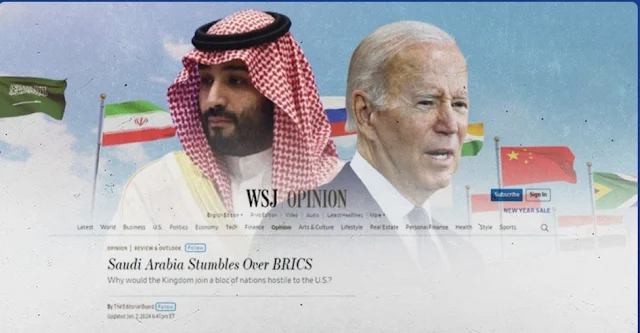Saudi Arabia and Israel have been quietly negotiating a peace deal that would be attached to a US-Saudi defense treaty. So why is Saudi Crown Prince Mohammed bin Salman putting that at risk by joining the BRICS
This is the question that came up on Tuesday as Saudi state television said that the kingdom has officially joined the BRICS bloc. BRICS symbolizes Brazil, Russia, India, China and South Africa, which are long-time members of the group. They started when developing countries were mainly determined to grow.
But in recent years, led by China and Russia, the BRICS has evolved into a diplomatic bloc determined to counter Western influence. The bloc wants to create an alternative system of global finance that is less dependent on the US dollar for transactions and will be less vulnerable to Western sanctions.
Chinese President Xi Jinping in particular urges BRICS to expand in order to increase its influence against the United States and its allies. Last year, the group issued invitations to Saudis, UAE, Egypt, Iran, Ethiopia and Argentina. The new Argentine president Javier Mele declined the invitation, demonstrating good judgment considering how much his country needed Western funding. While he gets nothing from the BRICS.
The same cannot be said about the decision of the Saudis. Negotiations on the rapprochement between the Kingdom and Israel have been on a break since the war between Israel and Hamas began in October. But our sources say that both sides want to resume talks as soon as the war is over, and the negotiations are approaching 70% completion.
The Saudis want the stability of the Middle East to focus on modernization and economic development. Through a security guarantee from the United States, similar to what Washington has with Australia and Japan. This will be an insurance against Shiite Iranian aggression.
The question is why a country seeking such a guarantee would ally itself with a bloc of countries that now includes Iran, Russia and China - America's main global adversaries. Russia-in the sense of Vladimir Putin-is the president of the BRICS in 2024. This does not send a reassuring message to the United States. The Senate, which will have to approve a defense treaty by 67 votes. It will not be as easy to get these votes as it is, given the hostility on the Democratic left to the crown prince.
South Carolina Republican Senator Lindsey Graham directly made this point in a tweet on Tuesday: "is the U.S. Senate considering a country joining BRICS as an effort to strengthen that nation's relationship with the United States?""He also asked whether a country that is economically allied with Iran - a "state sponsor of terrorism under U.S. law" - would be subject to U.S. sanctions against Iran.
The Biden administration may not warn the Saudis against joining the BRICS. But the crown prince should pay attention if he really wants a defense agreement with the United States.




